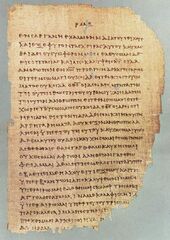The Epistle of James was written to Jewish Christians of the first century A.D. living in gentile communities outside Palestine, in an effort to expose hypocritical practices and to teach right Christian behaviour.
Author and Date[]
The epistle of James is generally attributed to James the Just, the brother of Jesus. However, there is some question concerning the authenticity of this claim. James is thought to have been written in 49 AD, prior to the Jerusalem council held in 50 AD.
James, brother of Jesus[]
James 1:1 states that the letter is from "James, a servant of God and of the Lord Jesus Christ." Theoretically, this could be any number of James', including a James not mentioned in the New Testament account. The traditional view on the authorship of this epistle is James, brother of Jesus -- technically half-brother. Three arguments for this view are as follows:
- The simplicity of the introduction seems to indicate that no further explanation was needed as to the identity of the James; certainly the brother of Jesus would not have needed a lengthy introduction.
- The author seems to have a great reverence for the Law, which would be consistent with the background of James.
- There are some linguistic similarities between the epistle and the speech of James in Acts 15.
Both Origen and Eusebius attribute the book to James, brother of Jesus.
Pseudononymous author[]
Some scholars argue for a pseudononymous author of James. Reasons cited for such a view could be any of the following:
- There is a lack of reference to Jesus Christ Himself in the letter.
- The superior level of Greek in the letter seems beyond what James, brother of Jesus, could have produced.
- The reverence for the Law issue is countered with a discussion on whether or not the works referred to in James are works of the Mosaic Law or general good works.
- The author appears to be well-versed in current Hellenistic philosophies.
Scholars holding to the traditional position are able to refute these arguments fairly easily, especially in consideration to the level of Greek used and the author's familiarity with Greek philosophy.
Blueprint[]
The epistle of James is generally divided into three sections:
- Genuine Religion (1:1-27)
- Genuine Faith (2:1 - 3:12)
- Genuine Wisdom (3:13 - 5:20)
James wrote to Jewish Christians who had been scattered throughout the Mediterranean world because of persecution. In their hostile surroundings they were tempted to let intellectual agreement pass for true faith. This letter can have rich meaning for us as we are reminded that genuine faith transforms lives. We are encouraged to put our faith into action. It is easy to say we have faith, but true faith will produce loving actions towards others.
Themes[]
Major themes contained with James include:
- Living Faith - James wants believers not only to hear the truth, but also to do it. He contrasts empty faith (claims without conduct) with faith that works. Commitment to love and to serve is evidence of true faith. Living faith makes a difference. Make sure your faith is more than just a statement - it should also result in action. Seek ways of putting your faith to work.
- Trials - In the Christian life there are trials and temptations. Successfully overcoming these adversities produces maturity and strong character. Don't resent troubles when they come. Pray for wisdom; God will supply all that you will need to face persecution or adversity. He will give you patience and keep you strong in times of trial.
- Law of Love - We are saved by God's gracious mercy, not by keeping the law. But Christ gave us a special command, "Thou shalt love your neighbor as yourself" (Matthew 19:19). We are to love and serve those around us. Keeping the law of love shows that our faith is vital and real. When we show love to others, we are overcoming our own selfishness.
- Wise Speech - Wisdom shows itself in speech. We are responsible for the destructive results of our talk. The wisdom of God that helps control the tongue can help control all our actions. Accepting God's wisdom will affect your speech. Your words will convey true humility and lead to peace. Think before you speak and allow God to give you self-control.
- Wealth - James taught Christians not to compromise with worldly attitudes about wealth. Because the glory of wealth fades, Christians should store up God's treasures through sincere service. Christians must not show partiality to the wealthy, nor be prejudiced against the poor. All of us are accountable for how we use what we have. We should not hoard wealth, but be generous toward others. In addition, we should not be impressed by the wealthy nor look down on those who are poor.
See also[]
References[]
- The Anchor Bible Dictionary Vol. 3, H-J by David Noel Freedman, Editor
- Dictionary of the Bible by W.R.F. Browning
- Hasting's Dictionary of the Bible by James Hastings
- Harper Collins Bible Dictionary by Paul J. Achtemer
- Dictionary of the Later New Testament and Its Developments by Ralph P. Martin and Peter H. Davids, Eds.
